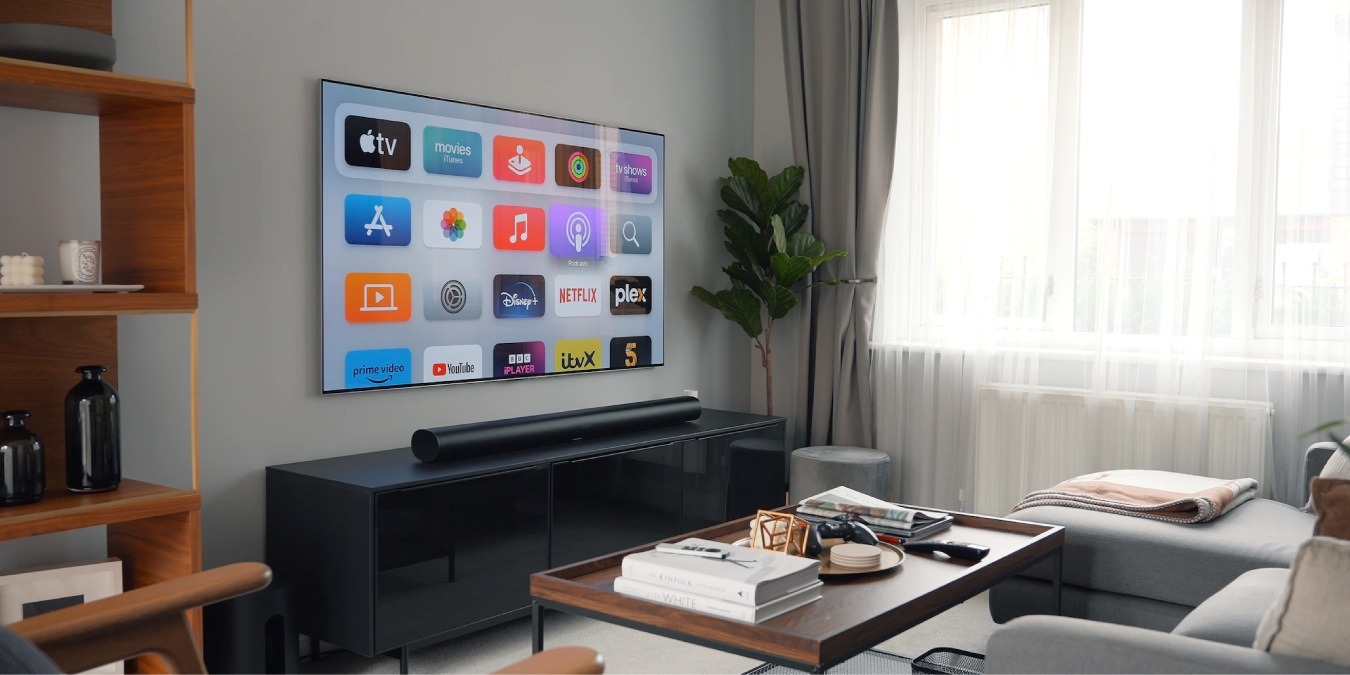7 of the Best Soundbar Options for Superior Immersive Audio

The right soundbar has the power to change your home theater experience. With so many on the market, it’s hard to know which option is the right one. Whether your primary concern is true surround sound or window-rattling bass, read on to find the best soundbar for your television.
Good to know: sometimes home theaters work better with speakers, whereas other situations call for a soundbar. Learn whether soundbars or speakers are better for your setup.
1. Best Overall: Samsung HW-Q800C
Price: $747.99
The Samsung HW-Q800C is an excellent choice for those wanting an immersive soundbar experience that covers all bases. The Samsung HW-Q800C is a true 5.1.2 channel Dolby Atmos soundbar. In addition to the five speakers within the soundbar and one subwoofer, there are two upward-facing speakers to give you the illusion of sound from above. When combined, these speakers equate to a rich and nuanced surround sound experience.
If you want to customize your audio further, do so via a number of sound modes and tone controls suitable for a wide variety of scenarios. Additionally, gamers can use Game Pro mode, designed to enhance directional sound effects, such as bullet ricochets or footsteps, within the game.
Samsung has incorporated Google’s Chromecast in the HW-Q800C to enable easy wireless streaming. It also supports Apple Airplay and Bluetooth to cast all of your favorite content seamlessly. Finally, if you use a Samsung phone, you can tap it on the HW-800C soundbar to instantly stream audio.
Pros
- 5.1.2A Dolby Atmos
- HDMI ARC allows two-way communication via a single HDMI cable
- Sync soundbar and compatible Samsung TV speakers via Q-Symphony
- Intelligently optimized audio for maximum speech intelligibility
- Supports AirPlay, Chromecast, and Amazon Alexa
Cons
- 48.5 inches long
- Q-Symphony only works with a Samsung TV
2. Best Small Soundbar: Sonos Beam (Gen 2)
Price: $499
At a mere 26 inches wide, the second iteration of the Sonos Beam packs an impressive punch for such a small package. Its tiny footprint allows it to easily fit even the most crowded entertainment setups.

The Sonos Beam boasts Dolby Atmos support. It adds depth to the sound, giving the impression that sound is coming at you from all angles. The Sonos Beam is also modular, meaning you can add satellite speakers and a subwoofer to expand the sound profile (for an additional cost).
Sonos’s TruePlay room correction technology measures how sound resonates within a particular room and how it impacts overall sound quality. It will analyze the size of the room, furniture placement, and the position of the soundbar, and make adjustments to ensure the best possible audio fidelity.

Pros
- One of the smallest soundbars available
- Compatible with Sonos subwoofer and speakers
- TruePlay technology maps the acoustic environment of the room
- Unobtrusive size
Cons
- Not a true Dolby Atmos experience
- TruePlay is only available on iOS devices
- Subwoofer required for strong bass
Also helpful: get the best quality picture with your new soundbar by checking out these top-performing 4K televisions.
3. Best All-in-One Soundbar: Sony HTS100F
Price: $99
If you’re after something simple to set up, that still boasts a massive upgrade from your TV’s built-in speakers, look no further than the Sony HTS100F. This soundbar is an all-in-one unit. This means there aren’t any other satellite speakers or subwoofers to connect or arrange around the room. Simply connect the soundbar to your TV, and you’re ready to bask in superior audio fidelity.

The Sony HTS100F is a 2-channel speaker, allowing you to achieve stereo sound, which is ideal for both TV shows and music. In addition, there is a voice enhancement feature that boosts dialogue and sits lower in the mix. The Sony HTS100F cannot analyze a room’s acoustics and make automatic adjustments to best suit the environment. Unfortunately, this makes any necessary tweaks a strictly manual endeavor.
The Sony HTS100F soundbar is connected to the TV through HDMI ARC, meaning you only need a single cable. This cuts down on clutter and makes installation a breeze. Furthermore, the soundbar is relatively compact and slim, making it suitable for virtually any environment. It measures 35.5 x 2.5 x 3.5 inches.

Pros
- Bluetooth connectivity
- Affordable
- Wall-mountable
Cons
- Bass frequency response isn’t the best
- No AUX input
4. Best PC Soundbar: Razer Leviathan V2 X
Price: $99.99
If you’re searching for a compact soundbar to sit below your PC monitor, look no further than the Razer Leviathan V2 X. Sound and power are delivered via a single USB-C cable, minimizing the cable clutter. The Razer Leviathan soundbar also offers Bluetooth 5.0, allowing you to quickly connect to a phone or tablet.

If you want to enhance your gaming experience with lighting effects, the Razer Synapse 3 software contains some preset lighting profiles. If you’re feeling creative, you also have the option to customize your own.
It is worth noting that the Razer Leviathan V2 X does not come with a subwoofer, so the bass output will be limited. Note that Razer does offer more expensive soundbars with compatible subwoofers, so if a bass-heavy sound is paramount, it could be worth spending more.

Pros
- Compact and affordable
- Includes Bluetooth 5.0 and uses a single USB-C cable
- Compatible with Chroma RGB integrated games
- Two full-range drivers and passive radiators for a wide frequency range
Cons
- Chews up a USB-C port on a PC
- Must have Razer Synapse 3 software to program RGB lighting effects
Tip: use RGB sync software to control the lights on all devices connected to your gaming PC.
5. Best Soundbar for Music: Sennheiser AMBEO Plus
Price: $1149.00
The Sennheiser AMBEO Plus is the best pick for those who want fantastic music quality from their soundbar. The AMBEO Plus utilizes nine low-energy amplifiers, which means it can pack a serious bass punch without needing a separate subwoofer.

That said, any audiophile knows that good music fidelity is not just about the bass. The AMBEO Plus does an excellent job replicating mid- and high-frequency sounds. This ensures that your soundbar can transition seamlessly between music, action, and dialogue, while maintaining clarity.
With 7.1.4 channels, the AMBEO Plus offers unmatched surround sound for an all-in-one soundbar. In addition, you can select from several sound profiles, such as voice enhancement, to get the most out of whatever you’re listening to.

Pros
- 7.1.4 sound
- Supports Bluetooth 5.0, Apple AirPlay 2, Spotify Connect and TIDAL Connect
- Dolby Atmos, Alexa, and Google Chromecast built-in
- Can wirelessly connect to Sennheiser subwoofers
- Smart Control App available
Cons
- Expensive
- Bulkier than other models
- Separate subwoofer needed for enhanced bass
6. Best Dolby Atmos Soundbar: Samsung HW-Q990C
Price: $1499.99
The Samsung HW-Q990C soundbar is an excellent option for those wanting a true Dolby Atmos surround sound experience. With an impressive 11.1.4 speaker array, you’ll experience sound coming from all angles. Furthermore, Samsung’s SpaceFit Pro technology will analyze the room and smooth out any echo created by high ceilings or hard surfaces.

The Samsung HW-Q900C boasts intelligently optimized audio to bring the most important sound – whether it be dialogue, music or action – to the forefront. In addition, you can further control the treble and bass manually via the EQ settings in the companion SmartThings app.
If you have a Samsung TV, you can take advantage of Samsung’s Q-symphony feature. Q-symphony syncs your Samsung TV speakers with your HW-Q990C soundbar, performing as one unified system. This delivers an even more immersive 3D sound experience.

Pros
- Built-in Alexa voice assistant and compatible with Apple AirPlay
- 11.1.4 channel system for amazing surround sound
- Establish a multi-room sound system via Alexa device groups
Cons
- Price
- Bulky, with multiple components
Also helpful: decide whether DTS or Dolby Digital is best before buying a soundbar.
7. Best Budget Soundbar: Vizio V-Series 2.1
Price: $139.99
You don’t have to break the bank to improve your TV audio experience. The Vizio V-Series 2.1 offers two speakers within the soundbar and a wireless subwoofer for added bass. It uses DTS Virtual:X technology to simulate surround sound instead of creating true surround sound with a multi-speaker array.

The Vizio V-Series 2.1 setup is easy, with multiple input options available. Furthermore, the addition of the HDMI ARC port means users can control the soundbar directly via the remote control of compatible TVs.
The Vizio V-Series 2.1 offers 3 EQ settings: music, movie, and game, via its remote control. Additionally, you can adjust the bass, treble, and subwoofer volume to customize your sound further. While it won’t create the immersive experience of a more expensive system, the Vizio V-Series 2.1 packs many features for its price point.
Pros
- Good bass for the price
- Sleek design
- Easy setup
- HDMI ARC, optical, 3.5mm analog input, and Bluetooth connectivity
Cons
- Not the best for music
- Will struggle in a big room
- Clunky integration with devices that utilize voice assistants
Frequently Asked Questions
How many decibels should a good soundbar have?
Decibels refers to the volume output possible from a soundbar. The decibel level that’s right for you will depend a lot on the size and acoustics of your room. But generally speaking, 90dB will perform well in a mid-sized room.
What size soundbar should I get?
Generally speaking, smaller soundbars will contain fewer speakers and offer a less convincing surround sound experience. If you provide sound to a large room, consider a system with a subwoofer and more speakers.
Do I need a 5.1 or 7.1 soundbar?
The number designation of soundbars (2.1, 3.1, 5.1, etc.) refers to the number of speakers and subwoofers that the soundbar contains. For example, a 5.1 soundbar has five speakers within the soundbar and one subwoofer. Sometimes there will be a third number, e.g., 5.1.2. The third number refers to upward-facing drivers, that is, speakers that point to the ceiling. For most people, a 5.1 system will suffice. But remember, more speakers and upward-facing drivers will improve the surround sound experience.
Image source: Unsplash
Subscribe to our newsletter!
Our latest tutorials delivered straight to your inbox




